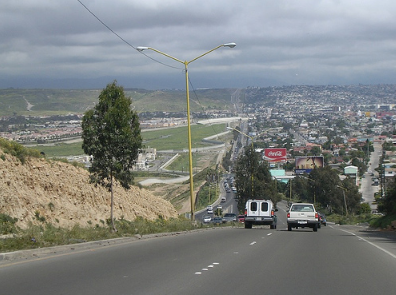Breaking
Border turns quiet under Trump amid steep drop in arrests

Just five people were eating dinner on a recent weeknight at a Texas church that is a stopping point for newly arrived immigrants on the U.S.-Mexico border. On a typical night last year, hundreds of immigrants might come through the church. (Photo: bergistheword/Flickr)
MCALLEN, Texas — Just five people were eating dinner on a recent weeknight at a Texas church that is a stopping point for newly arrived immigrants on the U.S.-Mexico border. On a typical night last year, hundreds of immigrants might come through the church.
Immigrants who are still coming say many people in their home countries are staying home amid fears about President Donald Trump’s immigration rhetoric, putting off coming to the U.S. until they see how his policies play out.
“There are mothers who heard that Trump might change the law to remove parents and keep the children here,” said Jose Gonzalez, a 29-year-old father of two from El Salvador. “That stopped a lot of people.”
The first months of the new administration have seen a huge drop in the number of people being caught by agents on the U.S.-Mexico border, raising the possibility that a “Trump effect” is keeping migrants away.
Fewer than 12,500 people were caught at the southern border in March, the lowest monthly figure in at least 17 years and the second straight month that border arrests dropped sharply. Homeland Security Secretary John Kelly, in testimony submitted to a Senate committee, called the decline “no accident” and credited Trump.
But those working in shelters and experts on migration say it will take several more months to judge whether any drop-off is lasting, and that the numbers could surge again as quickly as they’ve fallen.
Trump’s vows to step up deportations and build his signature border wall were widely spread in Central America, according to three migrants who recently arrived in Texas and spoke to the Associated Press. Kelly also announced last month that authorities might start separating adults and children crossing the border, to deter families from trying to enter the U.S.
For years, tens of thousands of migrants every month would cross the United States’ southern border. Traffic has surged in recent years of people crossing into Texas from three Central American countries torn by gang violence and poverty: El Salvador, Guatemala, and Honduras.
Former President Barack Obama’s administration also publicized deportations and tried to dissuade Central Americans from heading north, particularly during the 2014 surge of families and children travelling alone to cross the border. Officials took credit when border arrests fell during his tenure, only to see the numbers rise again.
Some think the real “Trump effect” was pushing fearful people to move up their journeys and get to the U.S. before he took office. Border arrests in October, November and December increased by about a third compared to the same period in 2015, before falling this year.
“The election and the possibility that the wall, everything was going to happen, encouraged them to come now,” said Sister Norma Pimentel, executive director of Catholic Charities of the Rio Grande Valley, which operates the shelter at Sacred Heart Catholic Church in McAllen.
Trump focused on the constant flow of migrants from the start of his campaign, when he denounced border crossers as criminals and rapists, and repeatedly promised to build a wall and step up deportations. His administration has started taking bids to build a wall and requested funding for more immigration judges and Border Patrol agents.
Most agree Trump’s statements affected migrant traffic. Four shelters along the Texas portion of the border, where most crossers enter the United States, say they’ve seen their numbers fall to a fraction of what they were seeing late last year. And La 72, a shelter near the Mexico-Guatemala border, saw its numbers in February and March fall by nearly half compared to the same months in 2016, suggesting that fewer people are leaving Central America.
Traffickers that operate in cartel-dominated parts of Mexico, known as “coyotes,” were rumoured to use the American election as a marketing tool. Rumors spread that if Democrat Hillary Clinton won, would-be migrants were told to make it to the U.S. ahead of the election to get a free pass to stay in the country. And if Trump won, they should rush north before he could build a border wall.
Higher demand allowed the smugglers to charge more to get to the U.
S. last year, according to Guadalupe Correa-Cabrera, a professor at the University of Texas-Rio Grande Valley.
Experts say they want to see if migrant numbers stay low during the summer months, when migration generally rises. Those who have long worked with migrants predict that as long as parts of Central America remain in turmoil, people will try to head north — whether or not the U.S. builds a wall or separates immigrant parents and children.
“If things get worse in their countries, and the situation with gangs does not get better, we will see them come,” Pimentel said.
Gonzalez said he left El Salvador because he feared the gangs and the constant threat of being robbed or attacked. Relatives in the United States lent him $15,000 to hire a smuggler for him and his children, ages 10 and 8. They rode in buses and a trailer through Mexico before safely sneaking across the Rio Grande in a month-long journey.
Sitting at Sacred Heart last month, Gonzalez and his children finished bowls of soup and waited for a bus to take them west toward relatives in California.
He hoped that if even if he was deported, his children would be allowed to stay and go to school, while he tried to come back.
“You’re conscious of taking that risk coming here,” Gonzalez said. “But it’s a risk you take to make things better for your family.”





















